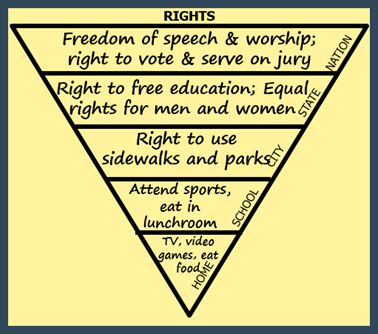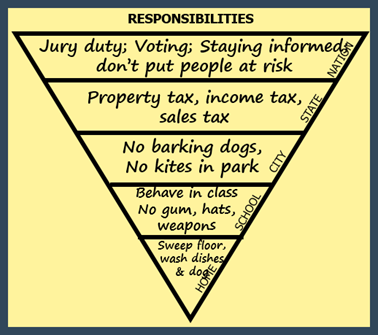Rights and Responsibilities


Unit Overview
In this
unit, students will identify the general rights and responsibilities of an
American citizen. (CS #14)
Section A: Content Statement 14
Content
Statement 14
In the
United States, people have rights
that protect them from undue governmental interference. Rights carry responsibilities that help define how
people use their rights, and that requires respect for the rights of others.
Content
Elaboration
People in
the United States have claims to protection from government intrusion in
certain aspects of their lives. These claims are called rights. The federal Bill
of Rights not only enumerates many rights but alludes to other unstated
rights.
Many of the
rights held by American citizens protect the ability to participate in the
political process, such as speech, press, assembly, petition, suffrage, and hold
public office. The U.S. Supreme Court, in its interpretation of the 14th
Amendment's due process clause, has instituted the doctrine of
incorporation, meaning that most of the guarantees in the Bill of Rights also
apply to state and local governments.
There are
general responsibilities of citizenship. They include respecting
the rule of law, paying taxes and fees, and accepting responsibility for one's actions.
There also are responsibilities associated with the exercise of particular
rights. Examples include:
• right of free speech – engaging in
civil discourse;
• right to bear arms – receiving firearms
training;
• right to a jury trial – serving on
juries; and
• right to vote – registering to vote and
being informed on public issues.
Citizenship also includes service to the nation, which guarantees the
rights of the people. This may consist of military service, community service,
and serving in public office. Individual rights are relative, not absolute. The
exercise of rights must be balanced by the rights of others and by the common
good.
Let’s Practice: Content Statement 14
Section B: Rights
A right is a privilege or a claim to
something. At the national level, the U.S. Constitution guarantees considerable
rights such as freedom of expression, freedom to peacefully assemble, freedom
to petition the government, freedom of worship, and the right not to have the
government search your stuff without a warrant. These rights are guaranteed to
everyone living in the U.S. — not just U.S. citizens! Rights that belong only
to U.S. citizens include voting in a federal election, serving on a jury, and
running for federal political office. State constitutions repeat many of the
guarantees in the U.S. Constitution, but they often add more. Your state
constitution might guarantee the right to free education or equal rights for
men and women. A city charter gives you the right to services your city
provides, such as sidewalks or parks.
It took the
work of all three branches to
protect the civil rights of African
Americans and other minority groups in the United States. As the leader of the
nation and the executive branch, the president holds an essential role in
bringing about change.
In 1963, President John F. Kennedy asked for
legislation "giving all Americans the right to be served in facilities
which are open to the public—hotels, restaurants, theaters, retail stores, and
similar establishments," as well as "greater protection for the right
to vote." He was assassinated that same year, but the new president,
Lyndon B. Johnson, helped push the bill through Congress. Finally, the Civil
Rights Act of 1964 became law. Both men used their power and influence to
enforce significant political and social change.
Change
in the Laws
Other
changes came about when new laws were passed through Congress:
·
The Civil Rights Act of 1964
prohibits discrimination based on race, color, religion, gender, and national
origin. This includes discrimination in the workplace, public places, schools,
and voting.
·
The 24th Amendment ended the
practice of poll taxes in 1964. States and local governments could no longer
charge citizens for the right to vote.
·
The Voting Rights Act of 1965
prohibits any restriction on the right to vote. This included poll tests and
voter intimidation. It followed through on the promise of the 15th Amendment.
Change
in the Courts
Many changes
came when the Jim Crow laws that limited the freedoms and rights of African
Americans were challenged in the courts:
·
Brown v. Board of
Education In
1954, the Supreme Court said racial segregation in public schools was
unconstitutional.
Let’s Practice: Civil Rights
The 14th Amendment stated, "all persons born or naturalized in the
United States… are citizens of the United States and the State wherein they
reside."
Americans
can become citizens by birth.
·
Physically born in the United
States
·
Born to citizen parents
Americans
can be naturalized citizens.
·
Complicated process
·
Same rights, responsibilities
What does it
mean to be an American citizen?
·
The right to live and work in
the U.S.
·
Right to vote and run for
office
·
Right to an education
·
Rights guaranteed by the
Constitution
·
"life, liberty, and the
pursuit of happiness."
American
citizens have duties and responsibilities of citizenship. A duty
is things you must do, like go to school.
A responsibility is things
you should do, like pay attention and be polite. Below are a few more examples.
|
Duties |
Responsibilities |
|
Pay your taxes |
Vote |
|
Obey the laws |
Be informed |
|
Serve on a jury |
Attend civic meetings |
|
Going to school |
Petition your government |
Responsibilities
are simply encouraged, but they are some of the essential features of our
society. Performing the responsibilities
of citizenship makes a person a good citizen.
Our democracy requires engaged citizens to work.
Let’s Practice: Rights and Responsibilities